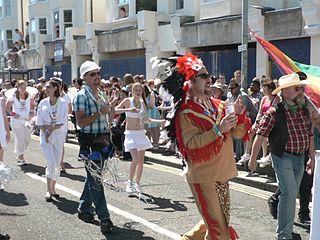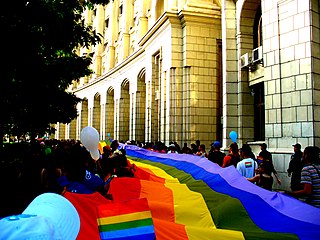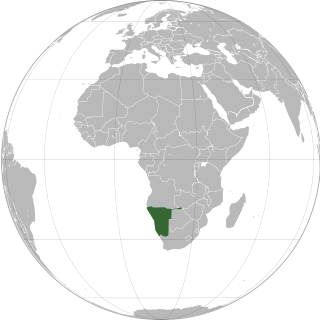Related Research Articles

The rights of lesbian, gay, bisexual, and transgender (LGBT) people in the United Kingdom of Great Britain and Northern Ireland have developed significantly over time. Today, lesbian, gay, and bisexual rights are considered to be advanced by international standards.

The San Francisco Lesbian, Gay, Bisexual, and Transgender Pride Celebration, usually known as San Francisco Pride, is a pride parade and festival held at the end of June most years in San Francisco, California, to celebrate the lesbian, gay, bisexual, and transgender (LGBT) people and their straight allies.

Brighton and Hove Pride is an annual LGBT pride event held in the city of Brighton and Hove, England, organised by Brighton Pride, a community interest company (CIC) who promote equality and diversity, and advance education to eliminate discrimination against the lesbian, gay, bisexual and trans (LGBT) community.
Over the course of its history, the LGBT community has adopted certain symbols for self-identification to demonstrate unity, pride, shared values, and allegiance to one another. These symbols communicate ideas, concepts, and identity both within their communities and to mainstream culture. The two symbols most recognized internationally are the pink triangle and the rainbow flag.

The LGBT community of Brighton and Hove is one of the largest in the United Kingdom. Brighton, a seaside resort on the south coast of England, has been described in some media as a "gay capital" of the UK, with records pertaining to LGBT history dating back to the early 19th century.

Pride in London is an annual LGBT pride festival and pride parade held each summer in London, England. The event, which was formerly run by Pride London, is sometimes referred to as London Pride.

Bucharest Pride, known previously as GayFest, is the annual festival dedicated to LGBT rights in Romania, taking place in Bucharest for nearly a week. Current event organizer is Kyle David Kipp. It first took place in 2004 and now occurs in May–June of each year, culminating with the March of Diversity. It is organised by the non-profit organisation ACCEPT, the country's largest lesbian, gay, bisexual and transgender (LGBT) rights organisation. The festival also receives funding from the Romanian Ministry of Health and the National Council for Combating Discrimination, as well as a number of private organisations, such as the Open Society Institute and the British Council in Romania.

Lesbian, gay, bisexual, and transgender (LGBT) people in Namibia have expanded in recent years, although LGBT people still have limited legal protections. Sexual contact between men is criminalised within Namibia, although this law is generally unenforced.

Manchester Pride is a charity that campaigns for LGBTQ+ equality across the United Kingdom, predominantly in Greater Manchester. The Charity offers dialogue, training, research and policy analysis, advocacy and outreach activities focusing on LGBTQ+ rights.

The Pride Quarter, also known as the Stanley Street Quarter, Liverpool Gay Quarter or Village, is an area within Liverpool City Centre, England. It serves as the main focal point for Liverpool's lesbian, gay, bisexual and transgender community. The quarter is made up of mixed use developments including residential blocks, hotels, bars, nightclubs and various other businesses, many of which cater for the LGBT community. Aspects of the annual Liverpool Pride are also held in and around Stanley Street.

WorldPride is a series of international LGBT pride events coordinated by InterPride; they are hosted in conjunction with local LGBT pride festivals, with host cities selected via bids voted on during InterPride's annual general meetings. Its core events include opening and closing ceremonies, a pride parade, and an LGBT human rights conference.

The Birmingham Gay Village is an LGBT district next to the Chinese Quarter in Birmingham city centre, centred along Hurst Street, which hosts many LGBT-friendly businesses. The village is visited by thousands of people every week and has a thriving night life featuring clubs, sports bars, cocktail bars, cabaret bars and shops, with most featuring live entertainment including music, dancing and drag queens.

Pride in Liverpool, is an annual festival of LGBT culture which takes place across various locations in Liverpool City Centre including the gay quarter. Audience numbers reach up to 75,000 people, making it one of the largest free Gay Pride festivals in Europe.

There have been pride parades in South Africa celebrating LGBT pride since 1990. South African pride parades were historically used for political advocacy protesting against legal discrimination against LGBT people, and for the celebration of equality before the law after the apartheid era. They are increasingly used for political advocacy against LGBT hate crimes, such as the so-called corrective rape of lesbians in townships, and to remember victims thereof.
Throughout Dallas–Fort Worth, there is a large lesbian, gay, bisexual, and transgender community. Since 2005, DFW has constituted one of the largest LGBT communities in Texas.
The LGBT community in London is one of the largest within Europe. LGBT culture of London, England, is centred on Old Compton Street in Soho. There are also LGBT pubs and restaurants across London in Haggerston, Dalston and Vauxhall.

Pride Cymru is an LGBT pride festival held annually in Cardiff, Wales.

Salento Pride is the annual Pride parade usually held in Gallipoli, Italy in August to celebrate the lesbian, gay, bisexual, transgender, asexual, intersexual and queer (LGBTQI+) community and their allies. The 2020 parade due to take place in Brindisi on 20 June, when over 5,000 people were expected to take part in support of LGBTQ+ and immigrant rights was cancelled due to the COVID-19 pandemic.
The United Kingdom has a number of gay villages. Bigger cities and metropolitan areas are most popular as they are deemed to be more tolerant and tend to have "a history of progressive local government policy towards supporting and financing LGBTQ-friendly initiatives." There is also a noted circular pattern of migration, whereby once areas have established a reputation as somewhere LGBT people live, more LGBT people are drawn there. LGBT-inclusive areas of UK towns and cities tend to be defined by "a distinct geographic focal point, a unique culture, a cluster of commercial spaces" and sometimes a concentration of residences. It is thought that LGBT-inclusive areas help towns and cities in the UK to prosper economically, but some believe the building of such areas creates an isolating effect on some LGBT people who want to blend in.
References
- "Reading Pride biggest and best – News – getreading – Reading Post". getreading. 6 September 2009. Retrieved 22 September 2011.
- "Pride festival needs town's vote – News – getreading – Reading Post". getreading. 3 February 2010. Retrieved 22 September 2011.
- "UK | England | Berkshire | National Front 'will not protest'". BBC News. 4 September 2009. Retrieved 22 September 2011.
- "UK | England | Berkshire | Gay Pride despite protest warning". BBC News. 3 September 2009. Retrieved 22 September 2011.
- "UK | England | Berkshire | Gay couples to commit with Pride". BBC News. 22 July 2004. Retrieved 22 September 2011.
- "UK | England | Berkshire | The Pride of drag Anne Robinson". BBC News. 29 May 2004. Retrieved 22 September 2011.
- "UK | England | Berkshire | Hundreds attend town Pride event". BBC News. 5 September 2009. Retrieved 22 September 2011.
- "Berkshire – Local radio – Take pride in your Pride". BBC. Retrieved 22 September 2011.
- "National Front to protest at Reading Pride | Lesbilicious – the web's tastiest lesbian magazine". Lesbilicious. Retrieved 22 September 2011.
- "Reading to celebrate fourth annual Pride Festival". PinkNews.co.uk. 29 August 2007. Retrieved 22 September 2011.
- Willis, Richard (8 September 2009). "Conservatives Support Reading Pride « Richard Willis's Blog". Richardwillisuk.wordpress.com. Retrieved 22 September 2011.
- http://www.realpride.com/company/3266
- "About Pride : Reading Pride – Celebrating Diversity Within the Thames Valley". Reading Pride. 3 September 2011. Retrieved 22 September 2011.
- http://www.activreading.com/community/detail/ReadingPrideRoyale-3402.html
- Jack Smith (27 August 2009). "Reading Pride refuses to give in to National Front". News.pinkpaper.com. Archived from the original on 16 July 2012. Retrieved 22 September 2011.
- "Domestic Abuse". TVGPA. Archived from the original on 16 July 2011. Retrieved 22 September 2011.
- "GaydarNation". GaydarNation. 31 August 2009. Retrieved 22 September 2011.
- "GaydarNation". GaydarNation. 23 August 2006. Retrieved 22 September 2011.
- "Berkshire – Features – Reading Gay Pride". BBC. 13 November 2007. Retrieved 22 September 2011.
- ↑ About. Reading Pride. Retrieved 10 July 2017.
- ↑ Festival 2009, Reading Pride, 2009.
- ↑ Vaughan, Peter. "CEO". Reading Pride. Archived from the original on 5 May 2013. Retrieved 14 April 2013.
- ↑ Pride, Reading. "About Us". MyUmbrella. Retrieved 4 September 2018.
- ↑ Vaughan, Peter. "CEO". Reading Pride. Archived from the original on 5 May 2013. Retrieved 14 April 2013.
- ↑ Vaughan, Peter. "Parade Route". Reading Pride. Archived from the original on 5 May 2013. Retrieved 14 April 2013.
- ↑ Vaughan, Peter. "CEO". Reading Pride. Archived from the original on 5 May 2013. Retrieved 14 April 2013.
- ↑ 1119891 — Reading Pride, Charity Commission, UK.
- ↑ Vaughan, Peter. "About". Reading Pride. Archived from the original on 5 May 2013.
- ↑ "Reading Pride Awards 2009 Winners".